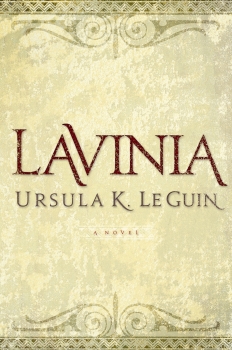Inspired by The Aeneid, Ursula K. Le Guin’s newest novel Lavinia takes the smallest character from Vergil’s epic poem and creates a thoughtful, moving tale of prophecy, myth and self-fulfillment. Lavinia is the teenaged princess of Latium, a small but important kingdom in pre-Roman Italy. As she moves into womanhood Lavinia feels pressure from her mother and father to choose one of her many suitors as both her husband and the future ruler of the kingdom. Being a princess and having a kingdom as her dowry, Lavinia's definitely a popular girl around the Mediterranean. The most ideal suitor is Turnus, young ruler of a neighboring kingdom who performs brilliant on the field of battle and makes all the women swoon. All the women, that is, except Lavinia. She finds him pompous, and lacking any shred of true piety. Torn by the desires of her parents and her own Lavinia travels to the oracles of the sacred springs, hoping they will lead her a proper path.
The oracles of the sacred springs say she will marry an unknown foreigner. This stranger ends up being none other than Vergil’s Aeneus, proud hero, king without a country and the man who will lay down the foundations of the Roman Empire. Their marriage sparks a war to control the region, and while we don’t see the glorious battles of Aeneus we do get the surprisingly moving perspective of the home front through Lavinia’s eyes.
Although best known for her works of fantasy Le Guin takes a more historical approach by toning down the magical elements; gods and prophecies play a vital role in Lavinia’s life but they are presented as concepts and rituals, not as deities playing petty games with the lives of mortals. This shifts the focus of Vergil’s plot from action to character, allowing Le Guin to breathe life into a character that never utters a word in the original story.
I'll be curious to see what the Feminist SF folks will make of this work. While I couldn't help but think of what Marion Zimmer Bradley did for the women of Arthurian legends in her Mists of Avalon, Lavinia is a very different book. It's been several years since I've read The Aeneid, but she's kept the basic plot the same. It's just with this we get a view backstage and discover that other factors besides the glorious battles played a major part in shaping one of the greatest Empires the world has ever seen. She doesn't go to unbelievable lengths to establish how important Lavinia's role was, but she does make it feel like Lavinia played an important part in this mythical story.
Lavinia herself is quite compelling as she transforms from a spirited princess into a queen full of wisdom who makes a profound impact on the lives of her people. While I think readers looking for action or plot oriented fantasy will not know what to make of this novel, anyone who appreciates deep layers of character development will be awed by what Le Guin does here.
Excelsior
